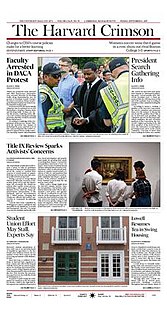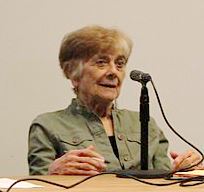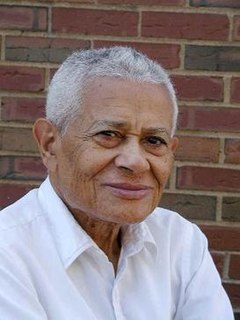
Boston University (BU) is a private research university in Boston, Massachusetts. The university is nonsectarian, but has a historical affiliation with the United Methodist Church. It was founded in 1839 by Methodists with its original campus in Newbury, Vermont, before moving to Boston in 1867.

Howard Zinn was an American historian, playwright, philosopher, socialist thinker and World War II veteran. He was chair of the history and social sciences department at Spelman College, and a political science professor at Boston University. Zinn wrote over 20 books, including his best-selling and influential A People's History of the United States in 1980. In 2007, he published a version of it for younger readers, A Young People's History of the United States.

The Harvard Crimson is the daily student newspaper of Harvard University and was founded in 1873. It is the only daily newspaper in Cambridge, Massachusetts, and is run entirely by Harvard College undergraduates. The newspaper is operated by The Trustees of The Harvard Crimson, a nonprofit organization.

A student publication is a media outlet such as a newspaper, magazine, television show, or radio station produced by students at an educational institution. These publications typically cover local and school-related news, but they may also report on national or international news as well. Most student publications are either part of a curricular class or run as an extracurricular activity.

John Robert Silber was an American academician and candidate for public office. From 1971 to 1996, he was President of Boston University (BU) and, from 1996 to 2002, Chancellor. From 2002 to 2003, he again served as President ; and, from 2003 until his death, he held the title of President Emeritus.

The Mugar Memorial Library is the primary library for study, teaching, and research in the humanities and social sciences for Boston University. It was opened in 1966. Stephen P. Mugar, an Armenian immigrant who was successful in the grocery business, provided the naming gift to commemorate his parents. Mugar's entrance carries an inscription from Stephen honoring his parents.
In coming to America from Armenia my parents opened the door of Freedom to me. America's public schools & libraries opened my eyes to the unlimited opportunity in this great land, as well as the privileges and obligations of citizenship. May this library serve over the years as a similar inspiration to all who use it. In memory of my father and mother Sarkis and Vosgitel Mugar. By their grateful son
– Stephen P. Mugar –
The Daily Free Press is the independent student newspaper at Boston University. It is a digital-first publication with daily online content and a weekly print edition on Thursday during the academic year. The Daily Free Press is staffed by about 200 volunteer editors, writers, reporters and photographers. The editorial positions change on a semester-to-semester basis. The paper is governed by a board of former editors, who make up the Board of Directors of Back Bay Publishing Co., Inc., a Massachusetts non-profit.

Frances Fox Piven is an American professor of political science and sociology at The Graduate Center, City University of New York, where she has taught since 1982.

William Worthy, Jr. was an African-American journalist, civil rights activist, and dissident who pressed his right to travel regardless of U.S. State Department regulations.

Boston University Wheelock College of Education & Human Development is the school of education within Boston University. It is located on the University's Charles River Campus in Boston, Massachusetts in the former Lahey Clinic building. BU Wheelock has more than 31,000 alumni, 65 full-time faculty and both undergraduate and graduate students. Boston University School of Education was ranked 34th in the nation in 2018 by U.S. News & World Report in their rankings of graduate schools of education. The School of Education is a member institution of the American Association of Colleges for Teacher Education (AACTE).
Stephen Martin Kohn is an attorney for Kohn, Kohn & Colapinto, a Washington, D.C., law firm specializing in employment law. The author of the first legal treatise on whistleblowing, Kohn is recognized as one of the top experts in whistleblower protection law. He also has written on the subject of political prisoners and the history of the abrogation of the rights of political protestors.
Murray Burton Levin (1927–1999) was a political science professor at Boston University from 1955 through his retirement in 1989. A progressive who once had been a member of the Communist Party USA, Levin was an unreconstructed radical throughout his academic career. In addition to teaching a popular core course on political science, Levin specialized in teaching Marxist political theory to both undergraduate and graduate students. Long before the collapse of the Soviet Union, Levin eventually came to the conclusion that Marxist theory was not a science, let alone a viable system of economics, but was a powerful propaganda tool to mobilize the masses against capital. Class consciousness would be obtained ultimately when the masses finally revolted against the oligarchy.
Jon Westling was an American educator, and was president of Boston University from 1996 until 2002.
Calvin Bow Tong Lee was an American educator and businessman who served as acting President of Boston University from 1970 to 1971 and Chancellor of the University of Maryland, Baltimore County from 1971 to 1976.
Sender Garlin was an American journalist pamphleteer, and writer.

A People's History of the United States is a 1980 nonfiction book by American historian and political scientist Howard Zinn. In the book, Zinn presented what he considered to be a different side of history from the more traditional "fundamental nationalist glorification of country". Zinn portrays a side of American history that can largely be seen as the exploitation and manipulation of the majority by rigged systems that hugely favor a small aggregate of elite rulers from across the orthodox political parties.

Cutting the Mustard: Affirmative Action and the Nature of Excellence is a 1987 non-fiction book by civil libertarian and United States lawyer Marjorie Heins about the Equal Protection Clause of the Fourteenth Amendment to the United States Constitution and its relationship to affirmative action and sexism. Heins discusses the case of Nancy Richardson, dean of student affairs at the Boston University School of Theology, who was removed from her position by the school's administration in 1981. Heins represented Richardson in an unsuccessful lawsuit against Boston University for wrongful termination and sexism. Cutting the Mustard recounts the case, interspersing reflections on the lawsuit with a discussion of relevant case law, decisions by the Supreme Court of the United States related to affirmative action and multiple criticisms of contradictory court decisions in affirmative-action cases.
Robert A. Dentler was an American sociologist who co-authored and oversaw the controversial court-ordered busing plan to desegregate Boston's public schools in the 1970s through the 1980s. He was involved in the school desegregation plans for at least sixteen other northern American cities and the University of North Carolina system.

Howard Bagnall Meek was an American educator of hotel management. He was the founder and first dean of Cornell University School of Hotel Administration that was the first to teach college level hotel management courses.
The 1979 Boston University strike was a labor strike involving employees at Boston University, a private university in Boston, Massachusetts, United States. The strike, involving faculty members, clerical workers, and librarians, began on April 5 and was fully ended by April 23.













